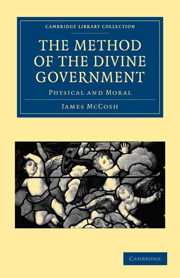Book contents
- Frontmatter
- Contents
- PREFACE TO FIRST EDITION
- PREFACE TO SECOND EDITION
- BOOK FIRST GENERAL VIEW OF THE DIVINE GOVERNMENT AS FITTED TO THROW LIGHT ON THE CHARACTER OF GOD
- BOOK SECOND PARTICULAR INQUIRY INTO THE METHOD OF THE DIVINE GOVERNMENT IN THE PHYSICAL WORLD
- BOOK THIRD PARTICULAR INQUIRY INTO THE PRINCIPLES OF THE HUMAN MIND THROUGH WHICH GOD GOVERNS MANKIND
- BOOK FOURTH RESULTS—THE RECONCILIATION OF GOD AND MAN
- APPENDIX ON FUNDAMENTAL PRINCIPLES
- REFERENCES TO AUTHORS AND SYSTEMS
PREFACE TO FIRST EDITION
Published online by Cambridge University Press: 29 August 2010
- Frontmatter
- Contents
- PREFACE TO FIRST EDITION
- PREFACE TO SECOND EDITION
- BOOK FIRST GENERAL VIEW OF THE DIVINE GOVERNMENT AS FITTED TO THROW LIGHT ON THE CHARACTER OF GOD
- BOOK SECOND PARTICULAR INQUIRY INTO THE METHOD OF THE DIVINE GOVERNMENT IN THE PHYSICAL WORLD
- BOOK THIRD PARTICULAR INQUIRY INTO THE PRINCIPLES OF THE HUMAN MIND THROUGH WHICH GOD GOVERNS MANKIND
- BOOK FOURTH RESULTS—THE RECONCILIATION OF GOD AND MAN
- APPENDIX ON FUNDAMENTAL PRINCIPLES
- REFERENCES TO AUTHORS AND SYSTEMS
Summary
We live in an age in which the reflecting portion of mankind are much addicted to the contemplation of the works of nature. It is the object of the author, in this Treatise, to “interrogate Nature” with the view of inducing her to utter her voice in answer to some of the most important questions which the inquiring spirit of man can put.
He thinks it needful to state, thus early, that he proceeds on the inductive method in his inquiry, and not, on the one hand, after the plan of those British Rationalists, who set out with a preconceived system, which they dignify with the name of Rational, and then accommodate all that they see to it; nor, on the other hand, of those German Intuitionalists, who boast that they can construct the existing universe by à priori speculation.
To guard against misapprehension, he wishes it to be understood, that he treats in this book, of the Method of the Divine Government in the world, rather than in the Church; of the ordinary providence of God, rather than his extraordinary dealings towards his redeemed people.
The reader of severe taste will be inclined to regard the Introductory Book as too loose and discursive; and all the apology that the author has to offer is, that he was afraid of driving back the general reader, by leading him into the minutiæ, before he had contemplated nature under its general aspect.
- Type
- Chapter
- Information
- The Method of the Divine GovernmentPhysical and Moral, pp. ix - xPublisher: Cambridge University PressPrint publication year: 2009First published in: 1850



